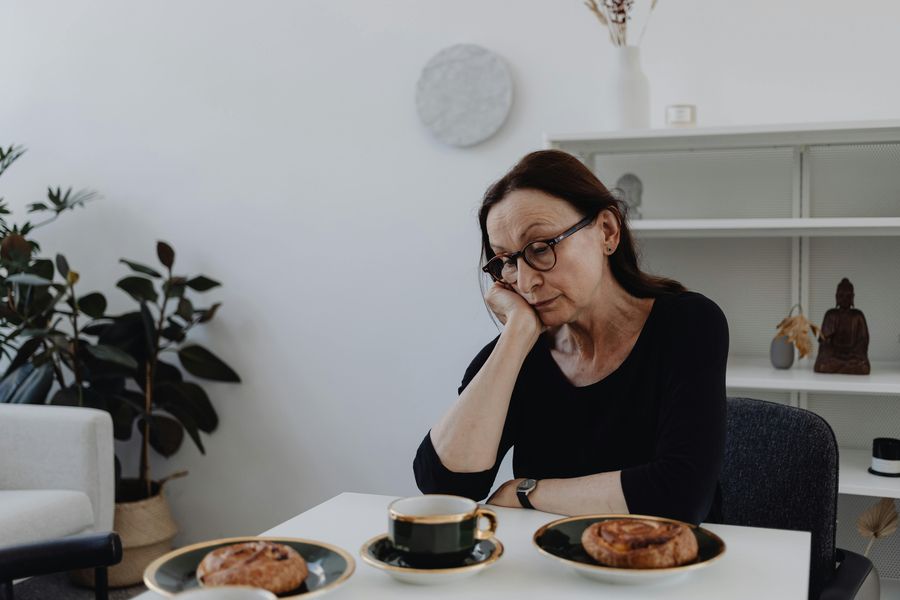How to Help Your Partner with Anxiety: A Guide to Understanding and Supporting Them
If you’re reading this article, chances are you or someone close to you is living with anxiety. Anxiety is a tough condition to live with, but with the right support, it can be managed effectively.
In this article, we’re going to discuss how you can help your partner if they are living with anxiety. We’ll cover everything from understanding anxiety to assisting them in finding help and taking care of yourself.
Understanding Anxiety Better
The first step in helping your partner with anxiety is to understand the condition better. Anxiety can take many different forms, including generalized anxiety disorder, panic disorder, social anxiety disorder, phobias, obsessive-compulsive disorder, and post-traumatic stress disorder.
Each type of anxiety has unique symptoms and triggers, so it’s important to be familiar with them. Living with anxiety means that there is often a heightened sensitivity to stressors, leading to fatigue, frustration, and sometimes even exhaustion.
To support your partner with anxiety, it can be helpful to have a frame of reference and ask them questions about their condition.
Communication
Open communication is key to any healthy relationship, but it’s especially important when supporting someone with anxiety. Your partner is the best source of information about their condition, so ask them what they need from you and how you can best support them.
Show your support by listening attentively and responding with kindness and understanding.
Refrain from Telling Them What to Do or How to Think
Many people with anxiety already feel guilty and ashamed, so it’s important to avoid rationalizing their feelings or telling them what to do. You can’t simply, “think positively” to overcome anxiety.
It is not productive to feel guilty or ashamed of having anxiety. Refrain from telling them to simply stop worrying or telling them they should be able to do certain things.
Your partner’s anxiety is not something they can control, and often this might lead to feeling embarrassed about it.
Make Them Feel Accepted
It’s important to show your partner unconditional love. Many people with anxiety feel like they’re not good enough or that their anxiety is a burden to their loved ones.
You can combat this by showing your partner that they are accepted and loved unconditionally. It can help create a sense of security which in turn reduces anxiety and anger and replaces these feelings with acceptance and love.
Assist Them in Finding Help
There are many ways to manage anxiety, from psychotherapy and pharmacology to other options. However, there are certain limitations with each type of therapy.
If your partner is comfortable and wants his or her symptoms managed, help them find therapy. See if there are specific therapists in the area with experience treating anxiety, and consider offering to go with your partner to the first session.
Be Aware and Set Boundaries
While it is important to create a safe environment for your partner, be mindful of where the line between accommodating their anxiety and enabling their behaviour lies. Accommodating too much might lead to the denial of opportunities and be draining and frustrating for you and your partner.
Sometimes the best learning experience can come from being put in uncomfortable situations and partaking in them. It can be a tough balance between accommodating and guiding, but avoid the extremes of either.
Focus on the Relaxing Time Together
Finding something that you and your partner can do together to bring calm and relaxation into your lives is a great idea. Activities like meditation, yoga, spending more time in nature, and mindfulness exercises are a few things that can be helpful.
Additionally, spending time together can help to create a more positive and relaxed environment, which can reduce anxiety levels for both of you. Take Care of Yourself, Too!
It’s easy to become stressed, worried, angry, or disappointed when supporting someone who is living with anxiety.
Make sure that you are taking care of yourself as well. Prioritize your own wellbeing, fulfilling life by doing other activities you enjoy outside of supporting your partner and take care of your mental health as well.
Conclusion
Supporting someone with anxiety can be challenging, but your support and efforts can make a huge difference. Understanding anxiety is the first step in providing the appropriate support for your partner.
To cope with anxiety, open communication, showing unconditional love, and assisting with finding professional help are some of the things you can do. Always be aware of the importance of taking care of yourself, and taking breaks to do other activities that bring you joy.
Remember that being there to support someone with anxiety is a role that requires plenty of patience, guidance, and most importantly, unconditional love and support.
Communicating with an Anxious Partner: Tips to Build Better Relationships
Effective communication is the backbone to any relationship, but it is especially crucial when communicating with an anxious partner.
Anxiety is a complex condition that affects how individuals see, process and interact with the world. They may become apprehensive about different things, which can make communication difficult.
Nonetheless, communicating respectfully and sensitively can help offer effective support, enhance your understanding of their anxiety triggers and help strengthen the bond between you and your partner. Here are some tips on how to effectively communicate with an anxious partner.
Tip 1: Importance of Communication
To provide effective support to your partner, it is critical to maintain a healthy communication channel. You want to ensure that they feel safe to express their feelings and experiences.
Encourage your partner to communicate their triggers, the symptoms they experience, and how you can offer help. Your partner should be able to express their concerns and their distressing thoughts without fear of judgment.
Tip 2: Listening Actively
The most fundamental aspect of communication is listening. By actively paying attention to your partner, you can help them feel respected and supported.
Set time aside for dedicated conversation time, minimize interruptions, and actively listen without judgment or criticism. It helps to acknowledge your partner’s feelings and validate their experiences.
You can offer empathy by acknowledging their feelings, like “I can tell how challenging this situation must be for you.”
Tip 3: Providing Reassurance
One of the most critical aspects of communicating with an anxious partner is to provide reassurance. This reassurance comes in many forms.
For instance, showing your love and physical presence by sticking with them through the tough times. Additionally, you can offer support and emphasize your dependability by checking in on them regularly.
It is equally important to recognize and celebrate even small progress they make.
Tip 4: Tips for Talking About Anxiety
Talking about anxiety with your partner can be challenging.
In these conversations, it is essential to be sensitive, honest, and open. Start the conversation with a gentle prompt like, “How have you been feeling lately?” Avoid making assumptions and using judgmental language.
Ensure that you communicate in a non-threatening manner that avoids hyperbole or ultimatums, like “you should stop worrying!” It is also important to consider the timing of the conversation. Choose a setting and time when both of you feel relaxed and are unlikely to be interrupted.
Helping Your Partner with Anxiety Seek Help: Breaking Down The Barriers
Coping with anxiety can feel exhausting and overwhelming. As a partner, you can help your loved one overcome the barriers to seeking professional help.
Overcoming these barriers can be a significant milestone in their journey towards managing their anxiety. Here are some of the most common barriers to seeking help:
Stigma
Stigma and discrimination are unfortunately prevalent when it comes to mental health conditions. Your partner may feel ashamed, embarrassed, or fearful of being judged.
Fear of Judgement
The fear of judgment or being labelled as weak or even ‘crazy’ can deter someone from seeking help.
Denial
Sometimes, the urge to deny that there is anything wrong can keep an individual from seeking help.
Lack of Information
A lack of knowledge regarding the cause and treatment options for anxiety can make it difficult for people to find help.
Logistics
Financial burdens, insurance coverage, and logistics, like transport, can also pose a significant challenge in seeking professional help.
Shame
Many individuals may feel shameful or find difficulty in acknowledging their condition to others.
Encouraging Your Partner to Seek Help
When providing support to your partner, it’s crucial to motivate them to seek professional help. Discuss the signs and symptoms that you have noticed and let them know how much you care about their wellbeing.
Help them research and identify treatment options that are catered to their specific needs. You can also recommend that they speak with their primary physician about their anxiety.
Assist in removing any perceived stigma or shame they might feel regarding seeking help.
Supporting Your Partner Through Treatment
Supporting your partner through treatment can increase the chances of a successful outcome. It is important to show an interest in their treatment, understand their treatment programs, and be patient.
You also want to provide a supportive environment that will help encourage them to stick with their treatment plan. Celebrate progress and milestones to show your support and demonstrate that anxiety can be successfully managed.
Remember, even small steps towards recovery or self-improvement deserve recognition!
Conclusion
Communicating effectively with an anxious partner is key to providing support and building a healthy relationship. It’s important to remember that anxiety is a complex condition, and there is no one-size-fits-all solution.
There are common barriers to seeking help, and by understanding and supporting your partner through these challenges, you can help them towards recovery. Remember, communication takes time and patience, so take your time, practice active listening, and be there for your partner every step of the way.
Managing Anxiety in Your Relationship: Balancing Self and Partner Care
Anxiety can significantly impact relationships, leading to stress, isolation, communication breakdowns, and emotional exhaustion. As a partner, it’s essential to balance taking care of yourself while supporting your partner’s needs.
In this article, we’ll discuss the impact of anxiety on relationships and provide tips for taking care of yourself as a partner. Additionally, we’ll explore how to balance the needs of your relationship and your partner’s anxiety.
The Impact of Anxiety on Relationships
Anxiety can take a toll on both the individual living with it and their partner. Commonly, anxiety may cause stress, which may lead to decreased communication or at times angry outbursts and conflict, leading to emotional strains and an increasing feeling of isolation.
Partners may feel helpless and unable to understand why their partner is experiencing anxiety, which may exacerbate their emotional exhaustion. Nonetheless, it is possible to help your partner through their struggles while still taking care of your own needs.
Taking Care of Yourself as a Partner
Taking care of yourself is vital for providing support to your partner. Consider setting boundaries for yourself, seeking professional help, and finding balance to avoid feeling overwhelmed by the situation.
Here are some tips on how to take care of yourself while supporting your partner:
Set Boundaries
Being a support system for your partner involves ensuring you also are not drained mentally or emotionally. It would be best to create boundaries that allow you to have some time apart and ensure that you are not constantly shouldering their anxiety all the time.
By setting boundaries, you get to avoid confusion and make sure that your partner embraces your decisions regarding receiving help from their therapist or mental health experts.
Find Support
Finding support is essential when supporting someone living with anxiety.
This may include talking to a trusted friend, family member or professional when feeling overwhelmed. Additionally, seek regular self-care activities such as exercise, meditation, or anything you enjoy doing.
Maintain Individuality
It’s important to maintain your individuality and remember who you are beyond your partner’s struggles. This may include prioritizing hobbies, personal growth, and socializing with friends.
Balance the Needs of Your Relationship and Your Partner’s Anxiety
Relationships can be challenging to navigate when one partner is living with anxiety. It’s essential to balance the needs of your relationship with the needs of your partner.
Here are tips on how to balance your needs and your partner’s anxiety:
Communication
Communication is the foundation of a healthy relationship. Touch base on how your partner is feeling, and also understand how anxiety is affecting them.
Ensure that you are attentive to your partner’s emotional needs.
Mutual Understanding
It’s essential to understand how your partner’s anxiety affects your relationship and recognize that it may change over time.
Ensure that you are both on the same page on providing support.
Prioritize Self-Care
Sometimes you may need to prioritize self-care to ensure that you have the capacity to be there for your partner.
This may mean taking time apart or going out for a walk when overwhelmed.
Adapting to Changing Circumstances
Understanding what triggers anxiety for your partner and adapting your behavior to ensure minimal triggers can be significantly helpful.
Such understanding will reduce your partner’s anxiety levels and provide the support you need, even as the dynamics of your partner changes over time.
Seek Professional Help
Professional help is necessary when supporting a partner living with anxiety.
Ensure that you encourage and support them for treatment. You can also support them by attending therapy sessions with them.
Conclusion
In conclusion, anxiety can have a profound effect on relationships, but it is possible to balance your partner’s needs while also taking care of yourself. By setting boundaries, finding support, and maintaining individuality, you can reduce the emotional strains of supporting a partner with anxiety.
Additionally, communication, mutual understanding, prioritizing self-care, adapting to changing circumstances, and seeking professional help are some of the crucial factors when balancing the needs between your relationship and anxiety. Remember, a little bit of self-care can go a long way in taking better care of yourself and being there for your partner.
In conclusion, managing anxiety in a relationship is a complex process, but it’s essential to prioritize communication and setting boundaries, finding balance, and seeking support when necessary. Anxiety can significantly impact individuals and their relationships, causing stress, isolation, communication breakdowns, and emotional exhaustion.
However, by understanding the impact of anxiety on relationships and taking care of yourself, you can be a source of support for your partner while also maintaining your own well-being. Remember, effective communication, mutual understanding, and seeking professional help can help you in balancing the needs of your relationship and your partner’s anxiety.
With these tips, you can navigate the challenges of managing anxiety in your relationship and build a stronger, healthier relationship.



